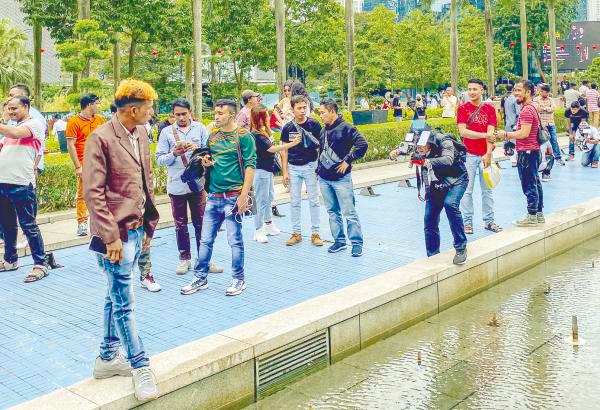KUALA LUMPUR: Malaysians should stop taunting migrant workers who are in the country seeking better opportunities for their livelihood as it only fuels xenophobia, activists said.
Tenaganita executive director Glorene Das told theSun that online disparagement of migrant workers needs to be stopped.
“There are social media videos in which (commenters) mocked overcrowding at ‘mini Dhaka’ in Jalan Silang here, as well as inside a mall during last week’s Chinese New Year celebrations.
“There are legal migrant workers in the country. They are not invaders but contribute to our economic development. We seem to forget this.”
The International Organisation for Migration said while documented migrant workers constituted 2.2 million of the total 14.4 million employees in the labour force as of 2022, the total number of migrant workers, regardless of their status, could amount to 5.5 million.
Das said the country depends on migrant labour despite previous pledges to reduce their numbers as they are needed to work in “dirty, dangerous and difficult” jobs, which shows that locals are still unwilling to replace them.
She said xenophobia is common the public based on their biases, leading to misunderstandings and a lack of awareness of the legal status of foreigners.
“Migrant workers are often (assumed) as illegals. Thousands of migrant workers have entered the country with documents approved by the authorities.”
Das urged the government to regulate labour migration through policies that benefit all stakeholders.
“Negative phrases like ‘migrant workers are a threat’ or ‘hiring them increases the costs which worsen the country’s economy’ are created to divert attention from the current migration situation in the country.”
She said ad hoc policies on foreign workers encourage the influx of human trafficking, contributing to xenophobia.
“We urge the government to implement a comprehensive policy for labour migration to regulate their recruitment, placement and employment,” she said.
Public health researcher and activist Dr Vinogiri Krishnan said people often blame migrant communities for limited job opportunities and wage suppression, especially in industries where they are more prevalent.
“Blaming them based on their occupation or physical attributes only perpetuates negative perceptions. The public must educate themselves about the contributions of migrant workers, to challenge discrimination and stand up against xenophobic actions.”
Universiti Malaya International Institute of Public Policy and Management senior lecturer Dr Aslam Abd Jalil said the Communications and Multimedia Act 1998 could be extended to include the prevention of hate speech against non-citizens, regardless of their legal status.
“Currently, section 233 of the Act covers the transmission of offensive or annoying communications via network facilities, while Section 211 prohibits distributing offensive content through content application services.
“In other words, providers and users of network facilities cannot share inappropriate, obscene, fake, threatening or offensive material with the intent to annoy, abuse, threaten or harass others.”
Aslam said while social media users must adhere to community guidelines, such platforms must also be vigilant in removing hate and harmful content to maintain social harmony and prevent such xenophobic comments about migrant workers.
He added that the authorities should also act against online hate speech targeted at migrant workers, while simultaneously educating the public on their economic contributions.
“We should treat migrants with dignity and protect their rights, just like how we expect to be treated abroad.
“We must recognise the contributions of Bangladeshi and Indonesian workers in Malaysia and foster mutual respect and understanding among our peoples.”









